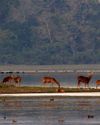
From 1571 (or 1569) when the stone was laid to 1585 when Emperor Akbar left for Lahore. It was for this very brief period of 14 short years (although debates are between 10 to 15) that Fatehpur Sikri was the capital of Emperor Akbar. From the moment its foundation stone was laid Fatehpur Sikri held a magnetic charm that continued to mesmerize centuries later.
Fatehpur Sikri was not just any capital city; it was a testament to the greatness of Emperor Akbar. Built with meticulous planning and attention to detail, the city boasted grand structures and awe-inspiring architecture. It was a melting pot of different styles and influences – a symphony in red sandstone and black and white marble. Venetian emissary Niccolò de’ Conti, renowned for his travels to the Vijayanagara kingdom, was enchanted by the grandeur of Fatehpur Sikri. His accounts described it as a masterpiece that celebrated the art and ingenuity of Akbar.
But why was this magnificent city abandoned after just a short period of existence? Legend has it that Fatehpur Sikri was created because of the blessings of Sheikh Salim Chisti, who was honored as Sekhu Baba by Emperor Akbar after his two sons were born. However, this is just a story. The true reason lies in Akbar’s quest for power and unity. Fatehpur Sikri was his personal manifestation of these ideals.
Bu hikaye Travellers' World dergisinin October - November 2023 sayısından alınmıştır.
Start your 7-day Magzter GOLD free trial to access thousands of curated premium stories, and 9,000+ magazines and newspapers.
Already a subscriber ? Giriş Yap
Bu hikaye Travellers' World dergisinin October - November 2023 sayısından alınmıştır.
Start your 7-day Magzter GOLD free trial to access thousands of curated premium stories, and 9,000+ magazines and newspapers.
Already a subscriber? Giriş Yap

National Parks Of India
India is blessed with a rich tapestry of biodiversity that is both a natural heritage and a national treasure. The concept of national parks in the country traces back to the late 19th century when the importance of conserving wildlife began to take root in the consciousness of the colonial administration. The first national park in India, Hailey National Park (now known as Rajaji National Park), was established in 1936, marking a historic commitment to wildlife conservation. The post-independence era saw an exponential increase in protected areas, primarily driven by a need to conserve India’s unique flora and fauna threatened by rampant industrialization and urbanization.

10 Fascinating Wildlife Sanctuaries
TO EXPLORE THE WILD SIDE OF INDIA

Conversation with the "BOOK MARKETING GIRL"
In an age where digital advancements and artificial intelligence often overshadow traditional practices, two visionaries have chosen a different path.

FARM AAVJOSAA - HER STORY
“Riddhi was a whirlwind of energy, unable to endure even a minute apart from her twin, Siddhi.

FOOD MEETS FANTASY IN CROATIA
As the sun dipped below the horizon, casting a warm golden glow over the rolling hills of Croatia, Foodpreneur Debaditya Chaudhury found himself on a gastronomic adventure that promised to tantalize his taste buds and inspire his culinary creativity.

THE UNTAMED BEAUTY OF SATPURA TIGER RESERVE
In Conversation with L. Krishna Moorthy, The Field Director of Satpura Tiger Reserve

SUNDARBANS THROUGH THE DECADES
As Witnessed By Anil Mistry, The Swamp Tiger Rescuer

LOOK EAST - WILDLIFE AND TOURISM IN THE NORTHEAST OF INDIA.
The North East of India is an ecological and biodiversity hotspot. Diverse habitats and ecosystems - each with its own species of birds, animals and plants – make this region home to an abundance of flora and fauna.

KAZIRANGA NATIONAL PARK AND TIGER RESERVE
There is a mad frenzy for travelling in recent times. Everywhere you look, read, or hear, people travel worldwide, domestic, offbeat travel has become a trend.

CORBETT NATIONAL PARK: A Legacy of Conservation and Biodiversity
From the moment I set foot in the enchanting and tranquil realm of Corbett National Park, a deep connection was forged in my heart.